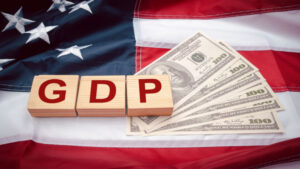Michael Normyle – Nasdaq’s US Economist joins IBKR’s Andrew Wilkinson and Jeff Praissman to offer insight on the current US and European economies and the effect of inflation on commercial real estate, fuel prices, and banking.
Note: Any performance figures mentioned in this podcast are as of the date of recording (April 24, 2023).
Sponsor Information:
Email: Michael.Normyle@nasdaq.com
Web: www.nasdaq.com
Summary – IBKR Podcasts Ep. 74
The following is a summary of a live audio recording and may contain errors in spelling or grammar. Although IBKR has edited for clarity no material changes have been made.
Andrew Wilkinson
Welcome everybody, this is Andrew Wilkinson with Interactive Brokers for another weekly podcast. I’m here with my colleague Jeff Praissman. Welcome, Jeff, how you doing?
Jeff Praissman
I’m doing great Andrew. Thank you.
Andrew Wilkinson
And I’m also here with Michael Normyle, US economist from the NASDAQ. Huge thanks to Michael for coming along, agreeing to talk on the show today. How are you, Michael?
Michael Normyle
Doing well, thanks for having me.
Andrew Wilkinson
So today’s subject is … Jeff and I were talking earlier on about whether the US economy — or even I think it’s more apparent that the global economy is suffering — but whether the US economy is actually really struggling. Has the US banking crisis put a lid on rate increases at the Federal Reserve, do you think?
Michael Normyle
Yeah, I think that’s safe to say. You know, prior to the crisis, we had market pricing in a peak rate around 5 and three quarters if you’re using just the top end of the feds range. And now it’s down to about 5 and a quarter, which is also where the Fed is at. And so, that’s a pretty significant shift and really what immediately preceded the banking crisis that’s where you had Powell testifying to Congress talking about 50 basis point rate hikes and that went away pretty quickly there. So, we never got to see kind of what the Fed rate projections would have looked like had this not happened but now market and the Fed are pretty much aligned at the 5 and a quarter peak rate. And the Fed also, Chair Powell and his commentary at the last meeting did mention that he considers tighter credit conditions akin to a rate hike or more, so that’s coming into play, making up some of that gap between the 5.75 and the 5.25.
Jeff Praissman
And kind of along those lines, Michael, do you think the crisis has had any impact on inflation and sort of where do you see it going if it has, over the next, say couple months?
Michael Normyle
Unfortunately, it’s too soon to tell really. A lot of the data that we have is only for March right now and when the survey weeks, if they were earlier in March, they might not have fully captured what happened with the banking crisis. But we did get the preliminary PMI data from S&P recently and that showed the input prices rising and prices charged rising, which is a bit of a surprise. You would think. that as this crisis, if it restricts credit conditions, then that means there’s less borrowing, there’s less which will restrict demand and that would result in lower inflation. So, you would think that maybe what we’re seeing from the PMI’s isn’t the best information just yet, so we need to wait until we get the April CPI in a couple weeks and see some more data. It’s just unfortunate we don’t really have the real time data that is capturing what’s happening with inflation just yet there.
Andrew Wilkinson
Is there a downturn in the dollar or rather is the downturn in the dollar more pronounced now that yields have stopped increasing and does that imply anything about the health of the economy?
Michael Normyle
I think that’s fair. I think if you go back to when the dollar was strengthening last year, that was when the Fed was much more aggressive than the other advanced economy, central banks. And so now the banking crisis has kind of changed that a bit where the drop in in rate hikes that are still expected to come is smaller for the Fed than for the ECD, for example. So, you get that kind of coming to play. Then on top of that, we the debt ceiling issue in the US that you hear demand for three-month Treasury bills has been reduced, which you know if people are buying that, that that requires dollars. And if that demand is reduced, then the margin would result in some depreciation there. So, that all adds up to, the dollar losing some strength here and then taking this a step further, if the US falls into recession in the next few months and say the Fed is cutting while other central banks have paused, or even still hiking a little bit, that could add to that too.
Andrew Wilkinson
We’ve been discussing a little bit here about the housing market and one could make the logical argument that the Fed not putting rates up as much or pausing has actually helped the housing market, we’ll wait and see. But I want you to talk a little bit about commercial real estate, that’s arguably where prices have been hit harder certainly by the pandemic related shifts and then a lot of the financing comes from the smaller banks. How does the US commercial real estate situation differ from that of Europe?
Michael Normyle
Two sides of the same coin, right? Where in one sense, lower rates will help the housing market make it a little cheaper to buy a house, right? But if credit conditions are tighter, it’s going to be harder to get a loan. So, it’s kind of — it’s not clear if it’s a positive or negative. Really more of a mixed bag there, but then getting back to commercial real estate, like you mentioned, the pandemic has hit certain sectors in commercial real estate pretty hard and it’s important to remember that commercial real estate is a pretty broad term. There’s offices, retail, data centers, warehouses, so it’s pretty, pretty broad. But if you look at things like offices and retail within that specifically, that’s where changes in peoples’ work habits, for example, with a lot more remote work that’s really negatively impacted the office market in the US. So in the US, we have a lot fewer people that have returned to office. If you compare that to Europe, for example, the vacancy rates in the US are much higher for offices compared to Europe. And then on top of that, as you mentioned that the commercial real estate, a lot of the funding in the US comes from small banks. So that’s why it’s become kind of a bit of a point of emphasis in the discussion of the banking crisis here, so it’s something like 70% of commercial real estate loans come from small banks and that accounts for about 40% of loans that small banks make. So, it’s hugely important to these small banks and if you see that asset values for these offices are coming down because they’re not getting as much rental income, then interest rates are going up when it’s time to refinance, getting a loan to value ratio that makes sense for banks is going to be harder. So, we’ve already seen some defaults, for example, one to one company defaulted recently on a series of office buildings where it had a floating rate on their mortgage. So, the monthly payment went from $300,000 a year to almost $900,000 a year – oh, I’m sorry, per month. And that chain was over a one-year time period so essentially tripling the monthly payment in in that one-year time span. And so, getting back to Europe, the situation was a little better. So, as we discussed already vacancy rates are lower. I think a lot of leases in the Nordics are inflation indexed so you get some protection there. And then lastly, the commercial real estate, it’s about 7% of bank loans in Europe. So, it’s just a lot less exposure there too.
Jeff Praissman
Does the central bank response to the US banking crisis – does it impact investor sentiment and if so, how?
Michael Normyle
It’s very important because the Fed and the Treasury, FDIC all made a concerted effort very early on in the banking crisis to calm depositors in general, but also that impacts investors. So, they created the bank term funding program, which is a new source of liquidity for banks where they can post their collateral value at par instead of at market value and then they obviously ensured all the deposits at the banks that failed and not just the ones that were up to the $250,000 limit there. So, there was a really quick move to kind of stabilize things which of course helps investors feel more stable too. And so, you’ve seen the equity market has actually done pretty well, especially if you exclude the banking sector in the last few weeks, despite the potential for crisis there. Of course, in the bond market we saw yields come down like the two-year Treasury went from over 5%. To under 4%, I think it’s 4.1 or so now, but those lower rates could be helping contributing to why the big name tech stocks have done well lately too.
Andrew Wilkinson
And Michael, it’s all relative at the end of the day, isn’t it? But in your opinion, does one region look more favorable in the aftermath of the crisis?
Michael Normyle
Well, Europe has looked better than the US for a while now. If you remember the US economy kind of ended 2022 on a bit of a weak note. We had negative retail sales growth month on month for November and December, same for industrial production. Inflation was coming down pretty quickly and then all of a sudden, the data in January was surprisingly strong and that caused some concern with the Fed and that related to why Chair Powell was talking early in March to Congress about doing a 50-basis point rate hike. But since then, the data that we’ve gotten has come in a lot weaker. And again, we’ve got negative retail sales growth, and negative manufacturing output. It looks like January was kind of a one-off there, whereas in Europe they’ve been getting a tailwind from the decline in energy prices more so. You see the PMI’s have been picking up there for a while, lower energy prices and their ability to find new sources of gas and cut their natural gas usage as well have really stabilized things there. So, it looks like Europe is on a bit more of an upward trajectory right now, more so than the US. And then plus it helps not being the epicenter of the banking crisis at the margin.
Andrew Wilkinson
So, the Europeans seem to get the added tailwind of supply changes for energy, whereas we seem to be stuck with high oil prices over here, we just can’t cut a break here.
Michael Normyle
Great way to put it. There was a bit where we’ve benefited from lower natural gas prices and still do and when there was that fire at the natural gas liquification plant in Texas a few months ago that took that offline, that kept more natural gas within the US, for example, and kept some off the export market. So that was a bit of a boost for the US in that sense for lower energy prices than Europe, especially since natural gas has been a huge issue for them recently. But like you said, yeah, the oil prices have been relatively high here, but we have seen that gasoline demand, for example, has been coming down a bit lower.
Andrew Wilkinson
Fascinating discussion, Michael Normyle, US economist with the NASDAQ. Thank you very much for popping in to join us today. We really appreciate that and Jeff Praissman.
Jeff Praissman
Thank you, Michael, it’s great the conversation. I’m looking forward to our next one.
Michael Normyle
Thanks for having me.
Andrew Wilkinson
Don’t forget everybody to check out IBKR Campus for all your educational needs. And don’t forget to look us up at Traders’ Insight and ibkrpodcasts.com.
Disclosure: Interactive Brokers
The analysis in this material is provided for information only and is not and should not be construed as an offer to sell or the solicitation of an offer to buy any security. To the extent that this material discusses general market activity, industry or sector trends or other broad-based economic or political conditions, it should not be construed as research or investment advice. To the extent that it includes references to specific securities, commodities, currencies, or other instruments, those references do not constitute a recommendation by IBKR to buy, sell or hold such investments. This material does not and is not intended to take into account the particular financial conditions, investment objectives or requirements of individual customers. Before acting on this material, you should consider whether it is suitable for your particular circumstances and, as necessary, seek professional advice.
The views and opinions expressed herein are those of the author and do not necessarily reflect the views of Interactive Brokers, its affiliates, or its employees.
Disclosure: Forex
There is a substantial risk of loss in foreign exchange trading. The settlement date of foreign exchange trades can vary due to time zone differences and bank holidays. When trading across foreign exchange markets, this may necessitate borrowing funds to settle foreign exchange trades. The interest rate on borrowed funds must be considered when computing the cost of trades across multiple markets.
Disclosure: Futures Trading
Futures are not suitable for all investors. The amount you may lose may be greater than your initial investment. Before trading futures, please read the CFTC Risk Disclosure. A copy and additional information are available at ibkr.com.











![[Gamma] Scalping Please [Gamma] Scalping Please](https://ibkrcampus.com/wp-content/smush-webp/2024/04/tir-featured-8-700x394.jpg.webp)






Join The Conversation
If you have a general question, it may already be covered in our FAQs. If you have an account-specific question or concern, please reach out to Client Services.